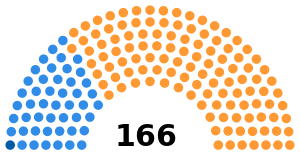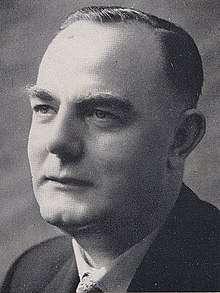1970 South African general election
The 1970 South African general election was held on 22 April for the 166-seat House of Assembly. Parliament was dissolved on 2 March and the deadline for the submission of candidates was 13 March. This was the first time in South African history that the House elected was responsible entirely to white people, as the seats of the four MPs elected separately by "qualified" Cape Coloured voters expired in the same year, heralding the completion of the process of political apartheid. Similarly, it was the first election after the expulsion of Albert Hertzog and many verkrampte (hardline) representatives from the ruling National Party in 1969, who formed the new opposition Herstigte Nasionale Party (Reconstituted National Party) in opposition, with limited success.
| |||||||||||||||||||||||||||||||||||||
All 166 seats in the House of Assembly | |||||||||||||||||||||||||||||||||||||
|---|---|---|---|---|---|---|---|---|---|---|---|---|---|---|---|---|---|---|---|---|---|---|---|---|---|---|---|---|---|---|---|---|---|---|---|---|---|
| Turnout | 74.35% ( | ||||||||||||||||||||||||||||||||||||
| |||||||||||||||||||||||||||||||||||||
 House of Assembly after the election | |||||||||||||||||||||||||||||||||||||
| |||||||||||||||||||||||||||||||||||||
 |
|---|
| This article is part of a series on the politics and government of South Africa |
|
|
|
Related topics |
|
|
The National Party (NP) won another election, for the first time under the leadership of John Vorster. Several new representatives were elected, including Chris Heunis, future Acting President and Pik Botha, future Minister of Foreign Affairs for 17 years, who made his maiden speech demanding that the government sign the UN Declaration of Human Rights.[1]
Given the split with both liberal camps and arch-conservative NP supporters, the government lost support in parliament for the first time since the 1948 election, its caucus being reduced by eight seats. While Hertzog's HNP did not win any seats, the split in the nationalist voter base benefitted the moderate United Party (UP) in some constituencies. On an ideological spectrum, the HNP (using the NP:s old acronym from the 1940s) was a psychological and cultural loss, with stalwart Afrikaner leader and NP founder JBM Hertzog's son denouncing the government for becoming bloated and moderate and having abandoned the goals of the Afrikaner nationalist movement in favour of economic and diplomatic realities. The result thus marked a realignment, with white voters jointly backing a moderate NP with a considerable majority, while the restoration of an Afrikaner homeland was abandoned as unachievable and anachronistic.
Following decolonisation, now burgeoning, Vorster attempted to pursue a policy of peaceful coexistence between the white minority government and Black independent neighbours (in 1970 only Botswana, Lesotho and Swaziland) as well as the greatest possible solidarity between Anglophone Whites and Boers, seen as pragmatic and antithetical to the goals of NP stalwarts of creating an Afrikaans-language republic for the Boers and their descendants, with other whites as (comparatively) privileged resident citizens, but outside the boundaries of the "chosen" people.
Helen Suzman, member of parliament for Houghton, retained her seat as the sole representative of the liberal Progressive Party.
House of Assembly results
Elections were held in 155 of the 166 constituencies (11 members elected unopposed). There were 2 028 487 registered voters and 1 508 248 votes were cast (74.4% of voters in contested constituencies).[2]
| Party | Leader | Candidates | Votes | %Votes | Seats | %Seats | Previous | Change | |
|---|---|---|---|---|---|---|---|---|---|
| National Party | John Vorster | 145 | 820 968 | 54.43% | 118 | 71.1% | 126 | −8 | |
| United Party | De Villiers Graaff | 149 | 561 647 | 37.23% | 47 | 28.3% | 39 | +8 | |
| Herstigte Nasionale Party | Albert Hertzog | 80 | 53 763 | 3.57% | 0 | 0.0% | 0 | ±0 | |
| Progressive Party | Jan Steytler | 19 | 51 760 | 3.43% | 1 | 0.6% | 1 | ±0 | |
| Independents | 14 | 9 622 | 1.35% | 0 | 0.0% | 0 | ±0 | ||
| Total valid | 407 | 1 497 760 | 100.0% | 166 | 100.0% | 166 | - | ||
| Spoilt votes | 10 524 | ||||||||
| Total votes | 1 508 284 | ||||||||
* one seat was filled in a subsequent by-election
Sources
- "Archived copy". Archived from the original on 1 October 2010. Retrieved 28 September 2011.CS1 maint: archived copy as title (link)
- IPU http://www.ipu.org/parline-e/reports/arc/SOUTH_AFRICA_1970_E.PDF

.jpg)